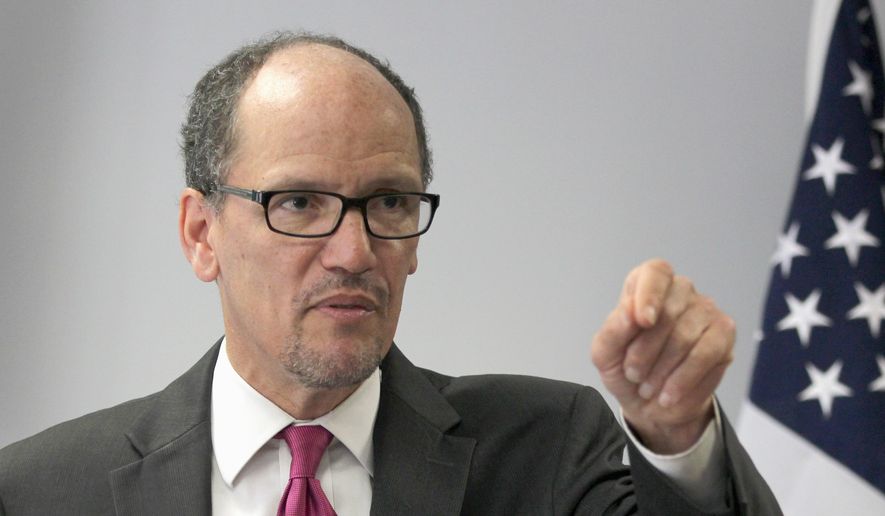Hillary Clinton may have broken the rules on handling classified emails, but Democrats insisted Sunday that it wasn’t her fault, blaming some of her confusion on mistakes or changes made by others.
The FBI released notes Friday from Mrs. Clinton’s July interview in which she said on 39 occasions that she could not recall or did not understand procedures related to classified emails, nor did she know that the (C) designation stood for “confidential.”
Labor Secretary Tom Perez said the FBI report showed that “there were a lot of markings that were at times incorrect and ambiguous, and weren’t in keeping with what the Department of Justice would have in place when they were marking documents that are confidential.”
“A lot of these documents were retroactively reclassified, so the classification system presented challenges as well,” Mr. Perez said on CNN’s “State of the Union.” “So again, I think this has been investigated very, very thoroughly, and she understands that she shouldn’t have done it, and I think she’s learned a lot from that.”
The former secretary of state at first publicly and emphatically insisted that she never received or sent any classified emails, before changing her public words to “classified at the time.” The FBI found even that statement to be untrue, but the interview notes show that she further claims she was unable in some cases to recognize classified documents.
Democratic vice presidential nominee Tim Kaine came to her defense Sunday by arguing that some emails were mislabeled.
“My recollection of the [FBI director] Jim Comey testimony before Congress was that many — that there were emails that contained classified information that had been improperly marked,” Mr. Kaine said on ABC’s “This Week.”
“So when she received the e-mail, the material that was classified, which is supposed to be flagged and identified as classified, in many instances was improperly labeled,” said the Virginia senator.
Based on his experience with handling sensitive material in the Senate, he said it’s sometimes hard to determine whether a document is classified or isn’t.
“Now I’m on two committees in the Senate, the Armed Services and Foreign Relations committees, where we do look at classified material,” Mr. Kaine said. “But we look at so much material, unless it is specifically pulled out and identified, it is difficult to know sometimes whether a statement or a paragraph is classified or not. And that’s what she was saying.”
He added that, “Unless it is identified in the way that it should be, it is difficult to know whether a particular material is classified or not.”
Republican vice presidential candidate Mike Pence was unpersuaded, saying that the FBI notes come as more evidence of a troubling pattern of secretiveness and legalistic dissembling.
“What’s evident from the notes, what’s evident from all of the revelations over the last several weeks, is that Hillary Clinton operated in such a way to keep her e-mails, and particularly her interactions, while Secretary of State, with the Clinton Foundation, out of the public reach, out of public accountability,” Mr. Pence said on NBC’s “Meet the Press.”
The FBI found that Mrs. Clinton had used 13 mobile devices, but that she could not produce any of them. One staffer said he had destroyed two of them, one by hitting it with a hammer.
Mr. Kaine argued that Mrs. Clinton has been forthcoming about admitting her mistakes.
“She said, ’Look, by using one device, I made a mistake. I apologize for it, I’ve learned something, and I wouldn’t do it again. And I want all the facts to come out. I’ll talk to congressional committees, we’ll provide the material,’” Mr. Kaine said.
• Valerie Richardson can be reached at vrichardson@washingtontimes.com.




Please read our comment policy before commenting.